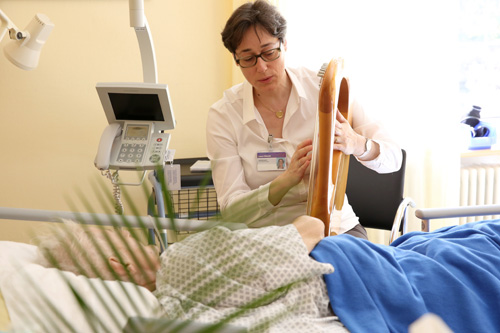Palliative Care
Matthias Girke
Last update: 04.04.2019
Palliative care is understood by the World Health Organization (WHO) to be the active, holistic treatment of patients with advanced diseases and limited life expectancies, where the highest priority is given to the control of pain and associated health complaints, and to dealing with psychological, social and spiritual questions (1, 2, 3). In this sense, Anthroposophic Palliative Care works with a spiritual-scientific understanding of the human being that places the concept of development at the foundation of patient care. In addition to addressing clinical symptoms, Anthroposophic Medicine incorporates therapeutic measures to support the patient’s life organization, as well as the needs of soul and spirit. The patient’s spiritual questions require special attention, which can lead to suggestions for meditative work or prayer.
When a patient experiences forward-looking therapeutic orientation and ongoing therapeutic commitment even in the palliative phase of his illness, this fortifies his strength and motivation to proceed on his own way. Studies have been known, already for quite some time, which suggest that palliative care improves prognosis (4). This means that palliative care can no longer be understood to be a phase of exclusively treating symptoms; it has its own therapeutic significance. The decisive aspect of Anthroposophic Palliative Care is that its approach to therapy is based on development: it is not about accompanying the “final” days of the patient, it is rather a time of preparation and development, which can already bear fruit during palliative treatment and which prepares for the patient’s future destiny. It is from this conviction that our therapeutic relationship to the patient develops, which especially in palliative care allows for growing closeness and a sense of connectedness to destiny.

Fig.: Receptive music therapy in palliative care. © Laura Piffaretti
Bibliography
- World Health Organization definition 2002, available at https://www.who.int/cancer/palliative/definition/en/ (14.3.2019)
- Deutsche Gesellschaft für Palliativmedizin e. V., Deutscher Hospiz- und Palliativverband e. V., Bundesärztekammer (ed.) Charta zur Betreuung schwerstkranker und sterbender Menschen in Deutschland. 2010.
- Müller-Busch HC. Was bedeutet bio-psycho-sozial in Onkologie und Palliativmedizin. Behandlungsansätze in der anthroposophischen Medizin. Jahrbuch der Psychoonkologie der ÖGPO. Wien: Österreichische Gesellschaft für Psychoonkologie; 2004.
- Temel JS, Greer JA, Muzikansky A, Gallagher ER, Admane S, Jackson VA, Dahlin CM, Blinderman CD, Jacobsen J, Pirl WF, Billings JA, Lynch TJ. Early palliative care for patients with metastatic non-small-cell lung cancer. New England Journal of Medicine 2010;363(8):733-742.[Crossref]